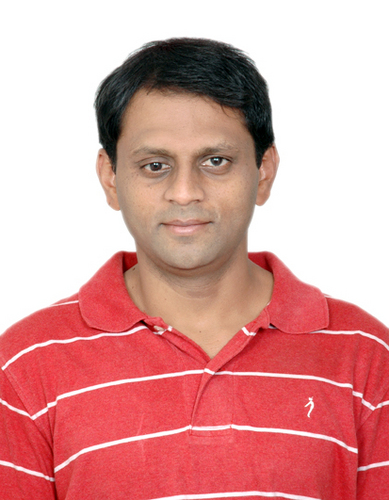Manjunath Gowda (Manju), CEO if i7 Networks, shares his experiences of starting up a products based company, ground up from India. In this freewheeling chat, he discusses on various topics ranging from branding the products, managing investor relationships to seeking IP protection for products offered in a niche, evolving marketplace. Read on…
What was the motivation for you to start i7, a product based company?
 The decision to start i7 actually was spurred due to a comment from a CEO of a multinational company. While in discussion with him in the valley, he seemed to indicate we folks from India would never be able to run a product company successfully out of India specifically in networking. While his comment pricked me instantly, I took time to objectively reflect on his observations. After analysis, it occurred to me that I could prove him wrong – since I figured out that we had all ingredients to build one and sustain it too. Besides this, I had just then successfully sold off my previous venture. I was looking at doing something more exciting. All of these converged, and so i7 Networks came to be.
The decision to start i7 actually was spurred due to a comment from a CEO of a multinational company. While in discussion with him in the valley, he seemed to indicate we folks from India would never be able to run a product company successfully out of India specifically in networking. While his comment pricked me instantly, I took time to objectively reflect on his observations. After analysis, it occurred to me that I could prove him wrong – since I figured out that we had all ingredients to build one and sustain it too. Besides this, I had just then successfully sold off my previous venture. I was looking at doing something more exciting. All of these converged, and so i7 Networks came to be.
You have chosen to build products in the Internet security space, and specifically addressing the BYOD challenges. Can you explain the reasons behind choosing this segment?
First, the Internet security space is the most volatile and evolving area that businesses need to deal with. Hence there is lot of opportunity to offer disruptive products and services, to meet diverse security needs of enterprise customers. The emerging challenge these days is due to change in the nature of threats. Earlier, most products and solutions were geared towards dealing with threats emanating from sources external to the enterprise. Now, enterprises are grappling with the damage that could be potentially caused due to the internal threats – ones that emerge from within the organization. BYOD is an easy entry point that could cause this. So, we chose to focus on providing products and solutions addressing this area.
How do you differentiate your offering with other players in your field? What are your strategies to achieve competitive advantage?
Our product is disruptive in the segment. Traditional vendors and competition is focused on deploying an agent on to every device that needs to connect to the network in order to discover and manage security threats. We have completely inverted this proposition – and are offering a purely agent-less and zero latency based solution. This means that users won’t in any way be disturbed as they connect their devices to the network and work. The IT policies in enterprises are increasingly being influenced by end users in the company these days. We plan to effectively leverage this shift in the decision making patterns of the IT companies and use it to our advantage.
Since you are offering an unconventional product, what steps are you taking to market your product, so that it is viewed favorably by prospective customers?
The folks in the line of business readily can see the benefits and advantages that our product brings to the table. However, to ensure that we have buy-in from all stakeholders in the enterprise, it is important to make them aware of our product and our strengths. Hence, brand building has become an important activity for us. We do it by positioning ourselves as the thought leaders in the BYOD security space. We are active on all the related forums on BYOD security; we publish and provide insights on BYOD security regularly in leading worldwide magazines, blogs. We are present in all leading conferences on this topic. These have helped us to gain visibility to a large extent. We are seeing some early successes. You should note also that we have not spent much by taking this course to market our product.
Second, recent developments in the world, especially the programs like PRISM from the US government have actually helped us open up new markets and opportunities. A lot of developing countries are now seriously considering evaluating indigenous security solutions rather than depending on MNC based vendors. This is one development which we plan to leverage effectively. In this regard, we are coming up with an alliance of likeminded security solution providers from the developing economies. We intend to form a common forum and through it, we want to engage with governments of emerging countries.
I would imagine that channels are an important aspect of you reaching out to the market. What has been your key learning, working with them?
Dealing with channel partners who operate in services space is entirely different on how one would work with channel partners in the products space. Having come out fresh from selling my services venture, I had a lot to unlearn in this aspect, and learn new ways of dealing with products selling channel partners. In the products space, the channel partners will listen to you only if you can help them solve today’s problems, or if you can solve a real need in the market that has not yet yielded satisfactory outcomes. As always, relationship and transparency builds in trust – and so, we have been able to rope in credible channel partners in East Asia, Europe and US.
I notice that you have repeat investors, even when the nature of your current company is vastly different from your earlier one. In this context, I would like to know what it takes for one to build sustainable relationships with your investors.
I guess being honest and being punctual with my investors helped me a lot. I respect human relationship without expecting anything from them.So, when I need anything it becomes easy to ask something. This is what I think has led to sustained faith being imposed by my investors on my ventures and plans.
You have taken steps to protect your IP by filing patents. Tell us your experiences as you filed your first patent?
I was completely naïve on the aspect of IP for my product. However, when I visited my friends in the Bay Area and discussed my product and its features with them, all of them educated me on the value of protecting my IP, especially given the disruptive nature of the offering. They forced me to file for a patent ASAP. Having done that, and after spending more time with them understanding the nuances and benefits of filing patents, I realize the merits of doing so. I would urge all product entrepreneurs to consider this seriously, especially when your product idea is in a niche, underdeveloped marketplace.
You have used media/PR effectively in both of your ventures. What tips do you have for product entrepreneurs in India regarding these activities?
In India, we tend to focus a lot on engineering/product development aspects, at the expense of other key and important aspects such as positioning and selling your products. One should realize that marketing your product is of paramount importance. Media and other online mechanisms such as blogs, online magazines etc are a great way to reach a wider set of audience. The key thing is to not do these activities in spurts, but as a regular habit. Results from these activities cannot be achieved overnight – it takes time, and a lot of hard work, patience and perseverance. You need to establish yourself as the go to person in the area of the product / offering. You also have to be honest and genuine in your views and opinions. This is how you can build credibility. In summary, never take your foot off the marketing pedal is what I would say.













